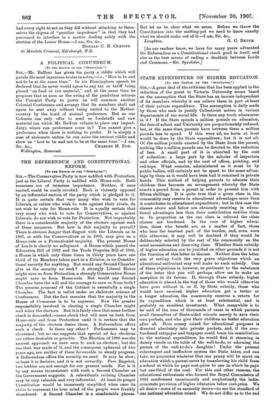THE REFERENDUM AND CONSTITUTIONAL REFORM.
[TO THE EDITOR OF THE "SPECTLTOR."1
Sla,—The Conservative Party is now saddled with Protection, just as the Liberal Party is saddled with Home-rule. Both measures are of immense importance. Neither, if once carried, could be easily revoked. Each is violently opposed by an influential section of the party which is pledged to it. It is quite certain that very many who wish to vote for Liberals, or rather who wish to vote against their rivals, do not wish to vote for Home-rule. It is equally certain that very many who wish to vote for Conservatives, or against Liberals, do not wish to vote for Protection. Not improbably there is a considerable majority of the electors against each of these measures. But how is this majority to prevail? There is obvious danger that disgust with the Liberals as in 1895, or with the Conservatives as in 1905, may give us a Home-rule or a Protectionist majority. The present House of Lords is clearly no safeguard. A House which passed the Education Bill of 1902 and the Trade Disputes Bill of 1906, a House in which only three times in thirty years have one third of its Members taken part in a division, is no Constitu- tional security for anything. But would any Second Chamber give us the security we seek ? A strongly Liberal House might save us from Protection, a strongly Conservative House might save us from Home-rule. But would any Second Chamber have the will and the courage to save us from both? The present proposal of the Cabinet is essentially a single Chamber. The fact is veiled under an elaborate scheme of Conferences. But the fact remains that the majority in the House of Commons is to be supreme. Now the greater responsibility involved in electing a single Chamber might well sober the electors. But it is fairly clear that some further check is demanded,—some check that will save us both from Home-rule and from Protection until it is certain that the majority of the electors desire them. A Referendum offers such a check. Is there any other ? Parliaments may be shortened; but no one suggests that special ad hoc elections are either desirable or possible. The Election of 1900 was the nearest approach we have seen to such an election; but the use that was made of it, and the consequent upheaval of two years ago, are neither of them favourable to steady progress. A Referendum offers the security we need. It may be slow; at least it is decisive, and it is not cowardly. Pace Bagehot, two lobbies are not enough for our present needs. Nor is it by any means inconsistent with such a Second Chamber as the Government suggests. A subordinate revising Chamber may be very valuable and very influential. At least its proper Constitution would be immensely simplified when once its claim to represent the true mind of the people were frankly abandoned. A. Second Chamber is a comfortable phrase.
But let us be clear what we mean. Before we throw the Constitution into the melting-pot we need to know exactly what we should make out of it.—I am, Sir, &c.,
[As our readers know, we have for many years advocated the Referendum as a Constitutional check good in itself, and also as the best means of ending a deadlock between Lords and Commons.—ED. Spectator.]


















































 Previous page
Previous page